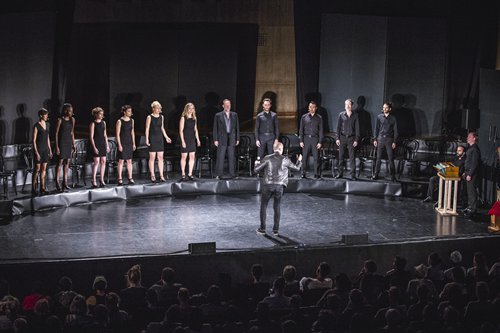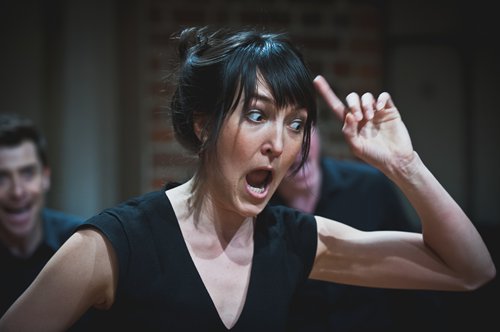HOME >> ARTS
‘Songs of Lear’
By Bi Mengying Source:Global Times Published: 2019/9/25 18:43:41
A powerful reinterpretation of a Shakespeare classic

Promotional materials for Songs of Lear Photos: Courtesy of the Song of the Goat Theater

Promotional materials for Songs of Lear Photos: Courtesy of the Song of the Goat Theater
Songs of Lear by the Polish ensemble Song of the Goat Theater has been quite successful on the global stage since its international premiere at the Edinburgh Fringe Festival in 2012. Since then it has swept three awards - Scotsman Fringe First, Herald Archangel and Musical Theater Matters Special Award. The performance has been very popular in China as well, so fans were excited to hear that it will be returning to Beijing, where it will be performed at the Tianqiao Arts Performing Center on October 19 and 20.
The show presents key scenes from the tragic story of King Lear by Shakespeare in various ways, such as a cappella singing and dramatic dance. Labeled as a "non-linear" production, the performance presents the different emotional stages of the characters.
From Wuzhen to Shanghai
Established in 1996, the Song of the Goat Theater has earned a reputation for itself among Chinese theater lovers since it took part in the annual Wuzhen Theater Festival back in 2015. At the festival, they made their debut in China with Portraits of the Cherry Orchard, in which the ensemble reconstructs the Anton Chekhov drama The Cherry Orchard as a modern dance performance. The performance proved so popular that the festival arranged more show times to cater to the high demand. On Chinese media review site Douban, the performance holds an impressive high score of 9.8/10.
"People welcomed me on the street, and continue to discuss Cherry Orchard. One lady told me that her university master told her that she will finally understand Czekhov's Cherry Orchard after 10 years and that my production came to her life exactly 10 years after this conversation. She said it allowed her to finally fall in love with Chekhov," Grzegorz Bral, co-founder and artistic director of the ensemble, told the Global Times when recalling his encounters with Chinese audiences after the performances in Wuzhen, East China's Zhejiang Province.
The ensemble is returning to China this October with Songs of Lear. Before its performances in Beijing, the troupe will also perform in Shanghai on October 12 and 13. Back in September 2017, the performance enjoyed great success in the coastal city when it was first staged at the Shanghai Concert Hall.
"The performance gave me goosebumps as well as made me cry. It was like listening to the holy songs at church. The charm and penetrating power of the human voice surprised me," wrote one Chinese netizen on China's Twitter-like Sina Weibo about the 2017 performance in Shanghai.
After the show
Besides the powerful singing, many Chinese who have seen the performance were intrigued by the novel forms of presentation, as well as the meaningful discussion that Bral hosted afterwards.
"I thought it would be like an opera with a cappella. Yet I was shocked to see the dozen of performers suddenly line up in a half-circle and start drumming. The Polish interpretation of King Lear was so deep and emotional. And the Q&A section explained the metaphor of Cordelia's (the youngest of King Lear's three daughters) shoes, the last scene about the king's death and destruction of the kingdom. The discussion touched my soul," wrote another review on Sina Weibo.
Bral noted that the Shanghai Q&A made quite the impression on him as well at the time.
"Usually in Europe maybe 5 to 10 percent of the audience stays for a post-production discussion, but in Shanghai almost 90 percent of the audience stayed, hungry to learn more about my art," Bral noted.
"And they asked so many deep and interesting questions. One question I still remember and I use this often in my classes as example: 'Why did you make King Lear?' It was an obvious but important question. That is why do you do theater. I really liked it," he said.
Hungry audience
"This time I decided to bring a stronger cast who is more advanced musically, so it is more powerful than the last time," noted Bral, comparing the performances this year with those in 2017.
The performance is what Bral calls a non-linear dramatic event that uses a relatively abstract method of storytelling, which can be challenging for audiences to completely follow.
Bral noted, however, that he has great faith in Chinese audiences.
"I feel the Chinese audience is particularly hungry for metaphors. They read deeply into what is not obvious. They understand the multilayered symbols in the performance and they even stop me on the street to ask additional questions. They are really very curious," he said.
Curiosity goes both ways when it comes to Bral.
"I personally feel there are not enough cultural exchanges between China and Poland. We do not really know much about your forms of art. It is quite necessary to learn more about China," he continued.
The director also shared that "my dream is to perform my productions in 100 Chinese cities!"
Will these wonderful productions further promote conversation between the two countries?
Chinese theater lovers await the answer with strong curiosity and much hope.